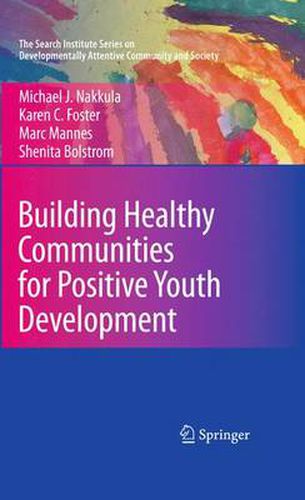Readings Newsletter
Become a Readings Member to make your shopping experience even easier.
Sign in or sign up for free!
You’re not far away from qualifying for FREE standard shipping within Australia
You’ve qualified for FREE standard shipping within Australia
The cart is loading…






This title is printed to order. This book may have been self-published. If so, we cannot guarantee the quality of the content. In the main most books will have gone through the editing process however some may not. We therefore suggest that you be aware of this before ordering this book. If in doubt check either the author or publisher’s details as we are unable to accept any returns unless they are faulty. Please contact us if you have any questions.
It is a great pleasure to offer this volume from Michael J. Nakkula, Karen C. Foster, Marc Mannes, and Shenita Bolstrom as the latest in the Search Institute Series on Developmentally Attentive Community and Society. Its importance to the series and this ?eld of inquiry and practice is readily evident in its title, Building Healthy Communities for Positive Youth Development. Since the early 1990s, Search Institute has invited and encouraged communities of all shapes and sizes to use its framework of Developmental Assets and principles of asset building to create strong, vibrant, and welcoming communities for children and youth. We have operated largely at the grassroots level, encouraging innovation and adaptation around a shared vision, rather than proposing a program or model for replication. We seek to learn as much from the communities as they learn from us. This book offers in-depth case studies of what happened in eight diverse c- munities that took up our invitation. In them, we see a wide array of strategies and approaches that, on the surface, seem to have little coherence. But, as Nakkula and colleagues found, underlying each of these distinct efforts was a deep commitment to transforming the social norms of community life to more effectively attend to young people’s healthy development throughout the ?rst two decades of life. There have been many ambitious efforts aimed at comprehensive community change on behalf of young people.
$9.00 standard shipping within Australia
FREE standard shipping within Australia for orders over $100.00
Express & International shipping calculated at checkout
This title is printed to order. This book may have been self-published. If so, we cannot guarantee the quality of the content. In the main most books will have gone through the editing process however some may not. We therefore suggest that you be aware of this before ordering this book. If in doubt check either the author or publisher’s details as we are unable to accept any returns unless they are faulty. Please contact us if you have any questions.
It is a great pleasure to offer this volume from Michael J. Nakkula, Karen C. Foster, Marc Mannes, and Shenita Bolstrom as the latest in the Search Institute Series on Developmentally Attentive Community and Society. Its importance to the series and this ?eld of inquiry and practice is readily evident in its title, Building Healthy Communities for Positive Youth Development. Since the early 1990s, Search Institute has invited and encouraged communities of all shapes and sizes to use its framework of Developmental Assets and principles of asset building to create strong, vibrant, and welcoming communities for children and youth. We have operated largely at the grassroots level, encouraging innovation and adaptation around a shared vision, rather than proposing a program or model for replication. We seek to learn as much from the communities as they learn from us. This book offers in-depth case studies of what happened in eight diverse c- munities that took up our invitation. In them, we see a wide array of strategies and approaches that, on the surface, seem to have little coherence. But, as Nakkula and colleagues found, underlying each of these distinct efforts was a deep commitment to transforming the social norms of community life to more effectively attend to young people’s healthy development throughout the ?rst two decades of life. There have been many ambitious efforts aimed at comprehensive community change on behalf of young people.